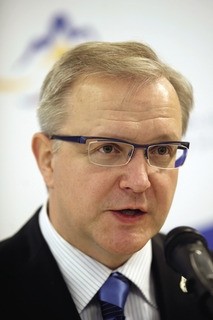
..
Do you know this guy?
You should, he has a lot more power to shape your future than the majority of European politicians.
Olli Rehn is his name, a Eurocrat with the conservative Centre Party in Finland.
His goal is to sort out Europeans addicted to such ‘unaffordable’ entitlements as decently paid employment and the security of reasonable old-age pensions.
Rehn is more technocrat than politician. Elected as a town councillor in Helsinki in 1988, he later had a brief sojourn in the Finnish Parliament (1991-95) and then a short career in the European Parliament as part of the (neo-) Liberal caucus in Strasbourg.
He is very comfortable dispensing tough love and harsh truths while buffered from the pressures of democratic accountability, a useful foil for conservative politicians wishing to avoid the liabilities of making such unpalatable utterances themselves. Rehn is thus a perfect creature for the Brussels élite and fits in well as a key member of the current European Commission.
This Olympian perch has allowed Rehn to become the archangel of fiscal sobriety or, if you prefer, the messenger boy for the needs of Europe’s overextended and reckless banks, ensuring that the costs of their speculative excesses are borne by Irish mortgage holders, French pensioners and Greek public servants.
But don’t misunderstand. Rehn is no paper tiger: he has real clout. His office gets to decide whether the cuts that have been made are deep enough for bailouts to proceed. The underlying logic is simple enough – public finance must honour its debt obligations before any of its other commitments to its citizens are even considered.
Otherwise, the whole financial system could well collapse due to something called ‘systemic contagion’, just like the proverbial deck of cards. Increasingly, however, people are beginning to think that the deck is already stacked in favour of (you guessed it!) those determined to keep their profitable stake in the financial system. Rehn’s regime of privatization and cutbacks means those dependent on the public sector go to the wall, while those with significant market power continue to thrive.
Still, you have to hand it to Olli: he has stood up to some ferocious criticism, whether in the form of burning cars and Molotov cocktails or sharp directives from the International Monetary Fund (IMF). The IMF has joined such illustrious (if unsurprising) critics as Nobel Prize economist Paul Krugman in their concern that the rigorous austerity regime being imposed upon Europe is digging the economic hole so deep and causing such widespread misery that the whole project of Europe and the Euro is in peril.
A well-documented report by IMF chief economist Olivier Blanchard demolished both the rationale and impact of the EU austerity policies imposed on Greece. Rehn was forced into immediate damage control, proclaiming that the IMF was ‘plainly wrong’ in its assertions, without offering much in the way of evidence. It was more hissy fit than policy debate. It all added up to a delightful dust-up among our economic overlords.
For almost three years now, Rehn has been insisting that the light at the end of the economic tunnel is in sight. All we need to do is stay the course. Yet record inequality continues to mount, economic growth is feeble to invisible and youth unemployment remains around 50 per cent in countries like Greece and Spain. Still, on the banquet circuit and in the five-star hotels that Olli so enjoys you can barely hear the police sirens and the smashing of glass. For now.
Sense of humour: Delicate self-modesty in replying to the criticisms of Paul Krugman in the New York Times that he was ‘the face of denialism when it comes to the effects of austerity’ led Rehn to declare that ‘people who are cleverer than me’ had failed to come up with appropriate solutions.
Low cunning: A freedom of information request (made by the Corporate Europe Observatory) revealed that during the financial crisis Rehn’s office had been meeting regularly with major banks and financial stakeholders such as the investment banker Goldman Sachs but that ‘no minutes were drafted’. There appear to have been no NGO or labour union meetings, however. Surprising, that.
from original post @ http://newint.org/columns/worldbeaters/2013/12/01/olli-rehn/
More Stories
Covid19 is here forever – unless we mend our selfish ways
A Corona credit crunch looms – get your cash out now?
10 phrases of Corona Media Speak # 9 Virtual Lock Down